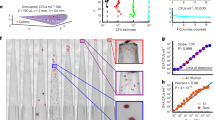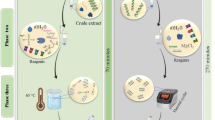Abstract
THE phenylalanine test is of great value for investigating cultures of organisms in the family Enterobacteriaceae. Organisms in the Proteus group are able to de-aminate the amino-acid, phenylalanine, to form phenylpyruvic acid, whereas members of the other groups in the family are unable to do so. Buttiaux et al. 1 claim that this test is more reliable than the urease test for the identification of Proteus strains.
This is a preview of subscription content, access via your institution
Access options
Subscribe to this journal
Receive 51 print issues and online access
$199.00 per year
only $3.90 per issue
Buy this article
- Purchase on Springer Link
- Instant access to full article PDF
Prices may be subject to local taxes which are calculated during checkout
Similar content being viewed by others
References
Buttiaux, R., Moriamez, J., and Papavassiliou, J., Ann. Inst. Pasteur, 90, 133 (1956).
Stewart, D. J., Nature, 183, 1537 (1959).
Author information
Authors and Affiliations
Rights and permissions
About this article
Cite this article
STEWART, D. A Micro-method for performing the Phenylalanine Test on Cultures from Multi-carbohydrate Media. Nature 191, 521–522 (1961). https://doi.org/10.1038/191521a0
Published:
Issue Date:
DOI: https://doi.org/10.1038/191521a0
Comments
By submitting a comment you agree to abide by our Terms and Community Guidelines. If you find something abusive or that does not comply with our terms or guidelines please flag it as inappropriate.



